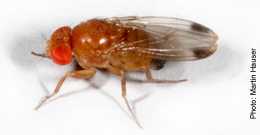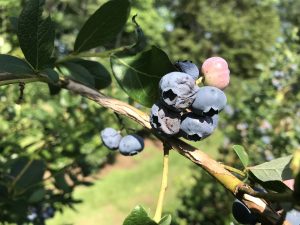Spotted Wing Drosophila Alert and Berry Notes — July 12, 2024
David Handley, Vegetable and Small Fruit Specialist; James Dill, Pest Management Specialist, Phil Fanning, Assistant Professor of Agricultural Entomology, Christina Howard, Maine New Farmer Project Manager

The early arrival of spotted wing drosophila fruit flies caused significant damage to some strawberry fields in southern Maine. Now that the strawberry season is over, other fruit hosts are at risk. We have already found larvae in early ripening raspberries, blueberries and cherries. Captures of flies in our traps are still moderate, but increasing. However, the presence of any larvae in ripening fruit should initiate a regular spray program to prevent further infestation. When 6 to 10 flies are caught in a yeast-baited trap in a week, larvae will start appearing in the fruit. This week counts have been ranging from 0 to 12 in our traps, indicating that that ripening fruit may need protection to prevent infestation.
Populations are likely to continue building in the coming weeks as more food (ripe fruit) becomes available for the flies, especially if conditions remain warm and wet as predicted. Now is the time to set out your own traps, if you haven’t already. Start protective sprays on any berries that have begun to ripen when more than four spotted wing drosophila flies are caught in a trap, or any larvae are noticed in the fruit. Look for fruit flies hovering around fruit and symptoms of premature fruit decay. At this point, a one to two week schedule of sprays should be adequate to minimize fruit infestation, but as populations continue to build, a 5-7 day spray schedule may be required.
For more information on identifying spotted wing drosophila (SWD) and updates on populations around the state, visit our SWD blog.
Berry Notes:
Japanese beetles are in very high numbers at many farms around the state, infesting raspberries, blueberries and grapes. In addition to feeding on foliage and fruit, they are a nuisance to pickers and often end up in the picking containers. Several of same products for controlling spotted wing drosophila will also provide control of Japanese beetles including Mustang Maxx® and Brigade®.

Anthracnose fruit rot is very likely to become a problem in blueberry fields as fruit ripens. The weather has been very conducive for this fungus. Infected berries soften and collapse. Small orange dots will develop on the fruit surface, which are the spores. These will be spread onto healthy fruit through rain splashing and dripping. Pristine®, Switch® and Captan® offer good control of anthracnose.
Other IPM Web Pages
Michigan State University Spotted Wing Drosophila
Penn State University Spotted Wing Drosophila Overview
University of New Hampshire SWD Weekly IPM Reports
David T. Handley
Vegetable and Small Fruit Specialist
Highmoor Farm
P.O. Box 179
Monmouth, ME 04259
207.933.2100
UMaine Extension Diagnostic Research Lab
Pest Management Unit
17 Godfrey Drive
Orono, ME 04473
1.800.287.0279
Where brand names or company names are used it is for the reader’s information. No endorsement is implied nor is any discrimination intended against other products with similar ingredients. Always consult product labels for rates, application instructions and safety precautions. Users of these products assume all associated risks.
In complying with the letter and spirit of applicable laws and pursuing its own goals of diversity, the University of Maine System does not discriminate on the grounds of race, color, religion, sex, sexual orientation, transgender status, gender, gender identity or expression, ethnicity, national origin, citizenship status, familial status, ancestry, age, disability physical or mental, genetic information, or veterans or military status in employment, education, and all other programs and activities. The University provides reasonable accommodations to qualified individuals with disabilities upon request. The following person has been designated to handle inquiries regarding non-discrimination policies: Director of Equal Opportunity, 5713 Chadbourne Hall, Room 412, University of Maine, Orono, ME 04469-5713, 207.581.1226, TTY 711 (Maine Relay System).
